News
Himachal preparing India’s first Climate-Smart Agriculture profile
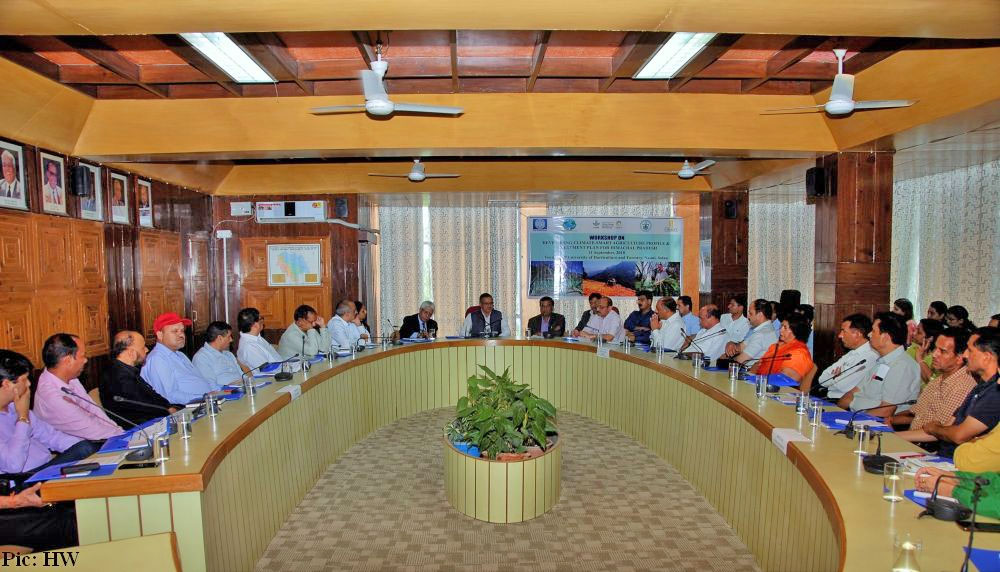
Solan: As part of its effort to prepare the first state-level Climate-Smart Agriculture (CSA) profile in India and to mainstream climate resilience into the agriculture sector, a broad consultation workshop was held at the Nauni based Dr YS Parmar University of Horticulture and Forestry.
The World Bank supported Integrated Development Project (IDP) of the Himachal Pradesh’s government and CGIAR Research Programme on Climate Change, Agriculture and Food Security (CCAFS) in collaboration with UHF’s Department of Environmental Science and the International Maize and Wheat Improvement Center (CIMMYT) organized the workshop.
The experts from state departments of Forests, Horticulture, Agriculture, Animal Husbandry, Environment, Science and Technology and scientists from UHF Nauni took part in the workshop.
The workshop aimed to leverage the understanding of the participants on climate change and develop a shared vision for scaling up CSA. The results of this discussion will inform future work on CSA in the state by identifying the key institutions supporting CSA, and the most appropriate technology packages for different zones across the state.
Dr Renu Saizal, Assistant Conservator of Forests welcomed the guests and gave a brief background of the IDP and the CGIAR. In his address, Dr Pramod Aggarwal, Regional Programme Leader of the CCAFS informed that they had collaborated with the World Bank to prepare CSA profiles of 20 countries and Himachal Pradesh was the first state in India where such a profile is being prepared.
Himachal was chosen because it is a fairly progressive state with rich experience and depth in data through ongoing projects, which needs to be analyzed. Globally, climatic issues are becoming more serious and Himachal Pradesh is no exception as it is bound to witness almost all aspects of climate change. It is now all the more imperative that what we do today should not become a maladaptation for tomorrow and therefore prepare an action plan for the state to address current and future climatic challenges,
said Dr Aggarwal.
The workshop was divided into two sessions. The first session was on the technologies, which can be implemented in the state, and the second focused on the institutions and policies.
The workshop was a participatory process through which we want to learn what the state was doing. An analysis of the feedback will be undertaken and the final report will be presented during a dissemination workshop. The report will lead to an investment plan and help to formulate the policy of the state,
added Dr Aggarwal.
Addressing the gathering Dr HC Sharma, UHF Vice-Chancellor said,
Himachal is very sensitive to climate change and this is a reality that cannot be ignored. Climate variability will lead to a shift in cropping patterns and it is important to identify crops, cultivars and animal breeds that can withstand drought stress.
He advocated for a stronger policy for public transport and the planned expansion of roads through maximum use of tunnels and pillars, which do not disturb the natural vegetation and water movement along the mountain slopes. Special focus must be given on water harvesting systems in homes to recharge groundwater, along with the promotion of precision farming techniques that maximize water use efficiency.
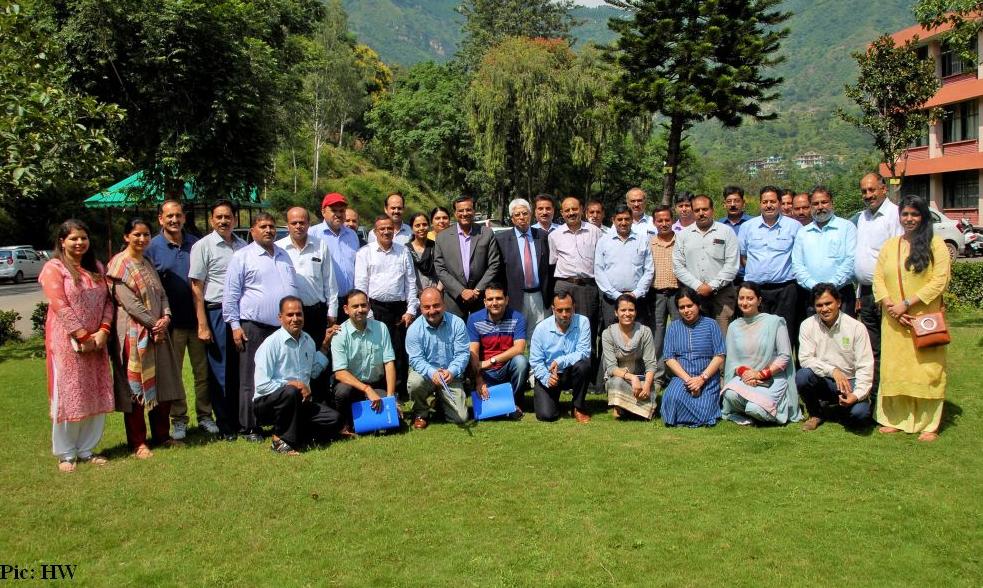
Dr SK Bhardwaj, Head UHF’s Department of Environmental Science explained the climatic scenario of the state. Calling for a collective effort on adaptation and mitigation of climate change, he said that state is experiencing warmer winters and snowfall has squeezed to January- Feburary months in place of November to February. He added that the tree line has also shifted upward and pointed out that the rainfall has become highly variable thereby causing frequent droughts and flash floods affecting crop productivity and leading to loss of property of the state.
Dr Bhardwaj lauded the efforts of the farmers to adapt to changing climate by growing alternative crops like kiwi, pomegranate and vegetables in place of apple, Kullu being the best example of the practice.
Several topics like irrigation, pasture management, agri-technology, weather-based crop insurance schemes and pollution from agricultural activities were also taken up during the workshop.
About the Climate-Smart Agriculture profile
This project builds on the Himachal’ investments in integrated watershed development and will support the government to identify and scale up adoption of the most appropriate CSA practices that increase farmers’ ability to adapt to climate change.
The objective is to support the Government of Himachal Pradesh to identify locally-relevant climate-smart agriculture (CSA) practices; understand the policy and institutional barriers to broader adoption of CSA practices; and identify appropriate technology solutions for monitoring the adoption of CSA practices and their impacts on climate adaptation and mitigation, including water use efficiency and water flow regulation.
News
HP Govt Employees to Get Higher Pay Scale on Completion of Two Years of Service: CM Jairam
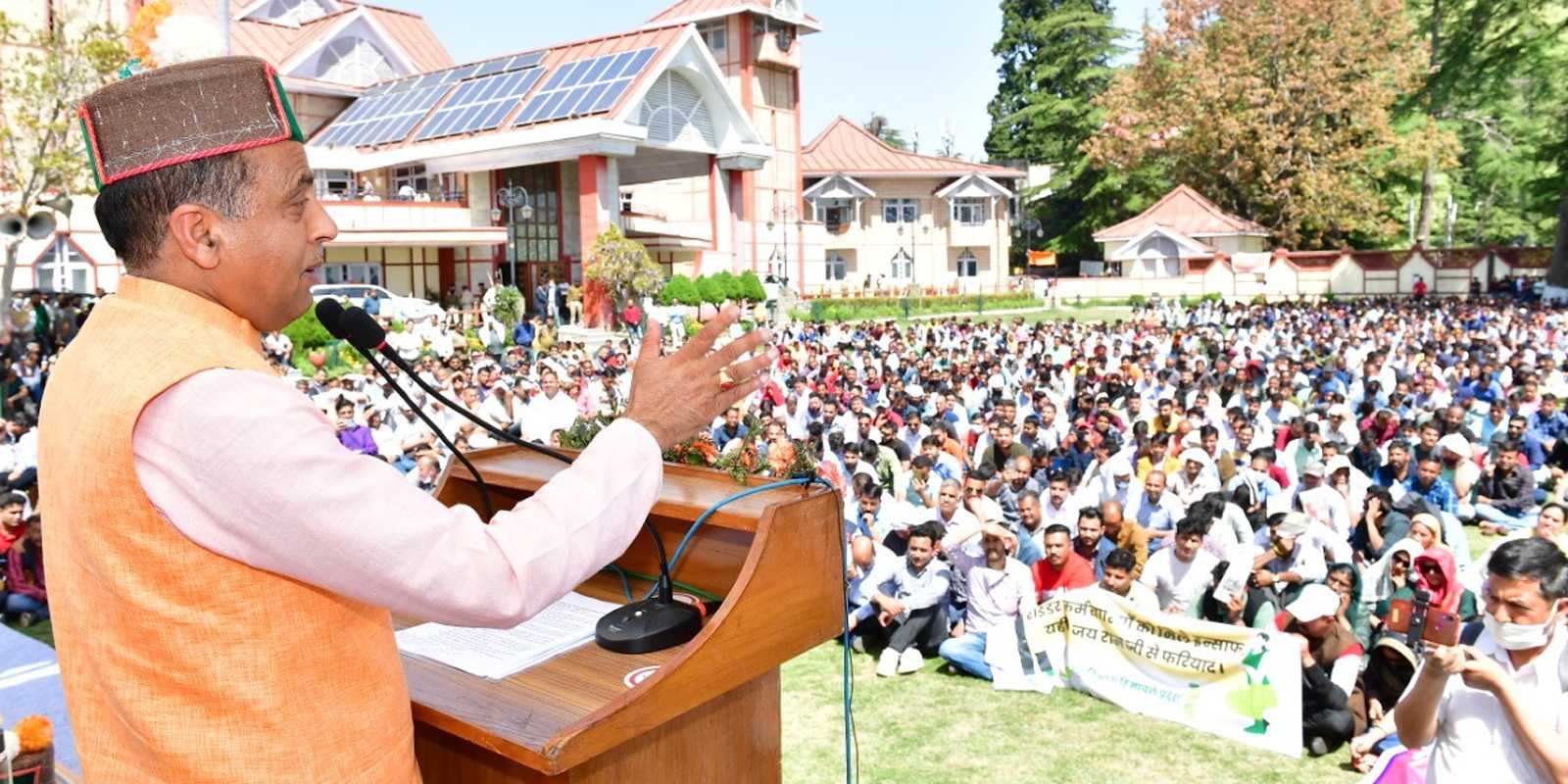
Shimla-Himachal Pradesh Government employees working in different departments before January 3, 2022, would be given a higher scale at par with other employees on completion of two years tenure of regular service. A higher pay scale was also announced for the Junior Office Assistants (IT) on completion of two years of regular service.
Chief Minister Jairam Thakur made these announcements during the Karamchari Maha Sammelan of the Himachal Pradesh Non-Gazetted Employees Federation at the hotel Peterhof on Sunday.
He appreciated the role played by the employee especially frontline workers in the battle against the pandemic.
He said most of the government employees in the state have been given revised pay scales and on average, every employee has got the benefit of a 12 to 15 percent salary hike. There has also been an increase in the pension of about 1.50 lakh pensioners of the state. The financial benefits of Rs. 7801 crore have been given to state government employees and pensioners from the year 2018 to 2022. The pensioners who retired before 2016 are getting the benefit of a 15 to 20 percent increase in the pension while around 40 thousand pensioners who retired after 2016 would be benefitted soon, he said.
He said the daily wages were Rs. 210 in the year 2017 which has been increased by the present state government to Rs. 350. Similarly, 12 per cent interim relief annually has been provided to government employees and pensioners during the present government’s tenure. He said the Himachal government has provided Dearness Allowance to its employees and pensioners on the lines of Punjab and Central governments from the due date. The Punjab government has given only 5 percent interim relief to the employees while the Himachal government has provided 21 percent interim relief to its employees.
“Out of the total interim relief amount given to the employees and pensioners amounting to about Rs. 6500 crore, Rs. 3500 crore has been paid during the tenure of our government” added the Chief Minister.
He said that the state government has increased the government contribution for NPS employees from 10 percent to 14 percent benefitting more than one lakh employees. The NPS employees are being given the benefits of retirement and death gratuity at par with employees falling under the old pension scheme. The government has also increased the upper limit of death gratuity from Rs. 10 lakh to Rs. 20 lakh.
The Chief Minister said the state government has also increased the honorarium of para-workers working in various departments. The salary of outsource workers has been hiked by Rs 1,500 per month.
Non-Gazetted Employees Federation President Ashwani Thakur thanked the Chief Minister for providing various financial and other benefits to different categories of government employees.
Nation
Most Covid Restrictions to be Lifted From March 31, Mask and Hand Hygiene to Continue
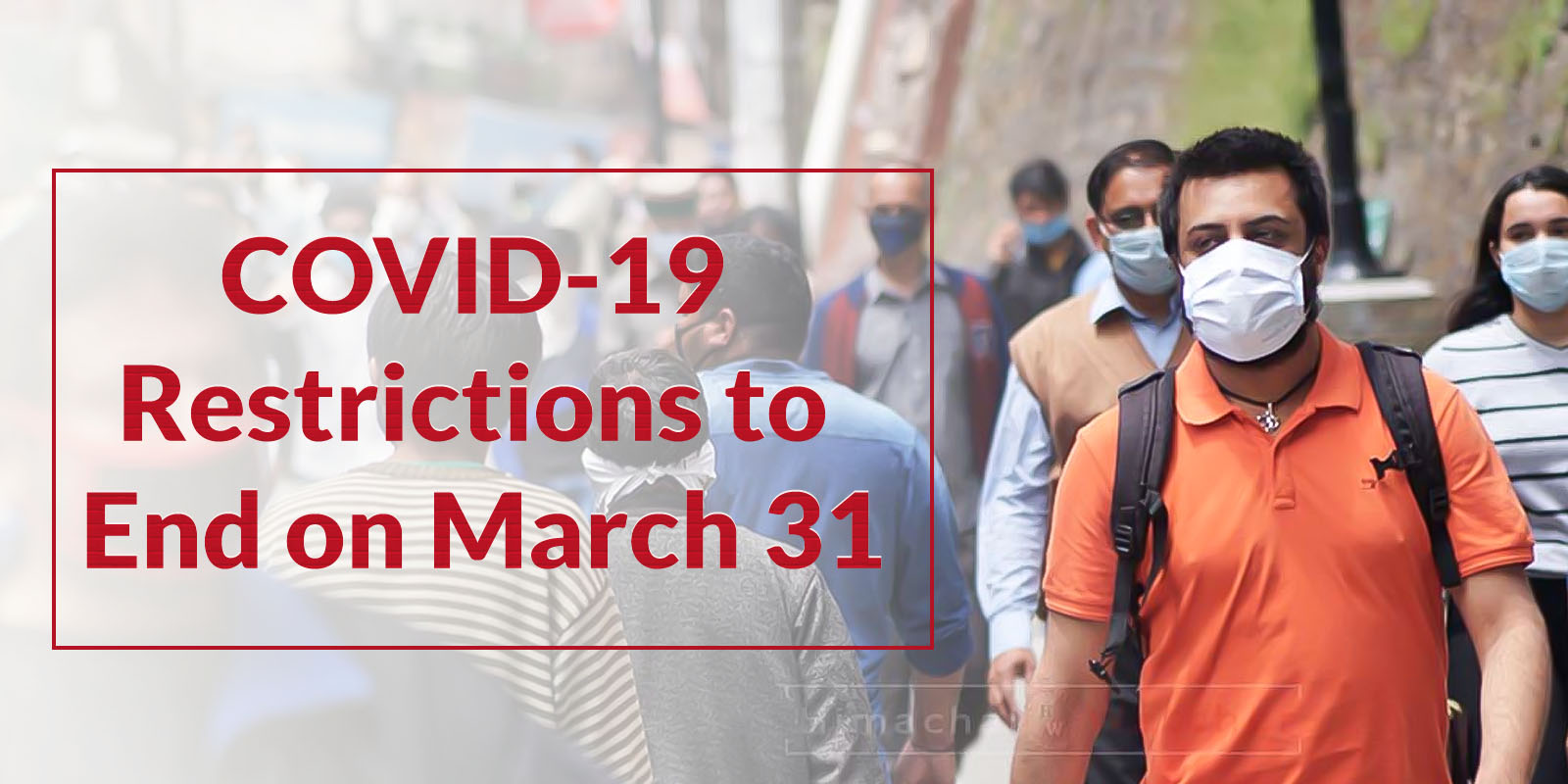
New Delhi-The Centre has issued a notification to the States informing that the provisions of the Disaster Management (DM) Act, 2005 will not be invoked in the country after March 31. The Union Health Ministry said that the use of face masks and following hand hygiene will continue.
It implies that most of the Covid-related rules and restrictions would end.
Union Home Secretary Ajay Bhalla issued the notification which said that the decision was taken following the overall improvement in the situation and the preparedness of the government in dealing with the COVID-19 pandemic.
However, local authorities and State police can still invoke fines and criminal cases against persons violating COVID-19 norms under the Indian Penal Code (IPC), a senior government official said.
The DM Act was invoked on March 24, 2020, due to the pandemic
“Over the last seven weeks or so there has been a steep decline in the number of cases. The total caseload in the country stands at 23,913 only and the daily positivity rate has declined to 0.28%. It is also worth mentioning that with the combined efforts, a total of 181.56 Cr vaccine doses have been administered,” the notification said.
“I would like to mention that in view of the nature of the disease, we still need to remain watchful of the situation. Wherever any surge in the number of cases is observed, the States/UTs may consider taking prompt and proactive action at a local level, as advised by MoHFW (Health Ministry) from time to time,” the notification said.
The Indian government had issued various guidelines and measures for the first time on March 24, 2020, under the Disaster Management Act to curb the COVID-19 situation in the country, which have been modified several times thereafter.
India currently has 23,087 active COVID-19 cases and recorded 1,778 new cases and 62 deaths in the last 24 hours. The daily positivity rate has also declined to 0.28%.
News
HP Cabinet Decisions: Country Liquor Made Cheaper in New Excise Policy, Read All Decisions
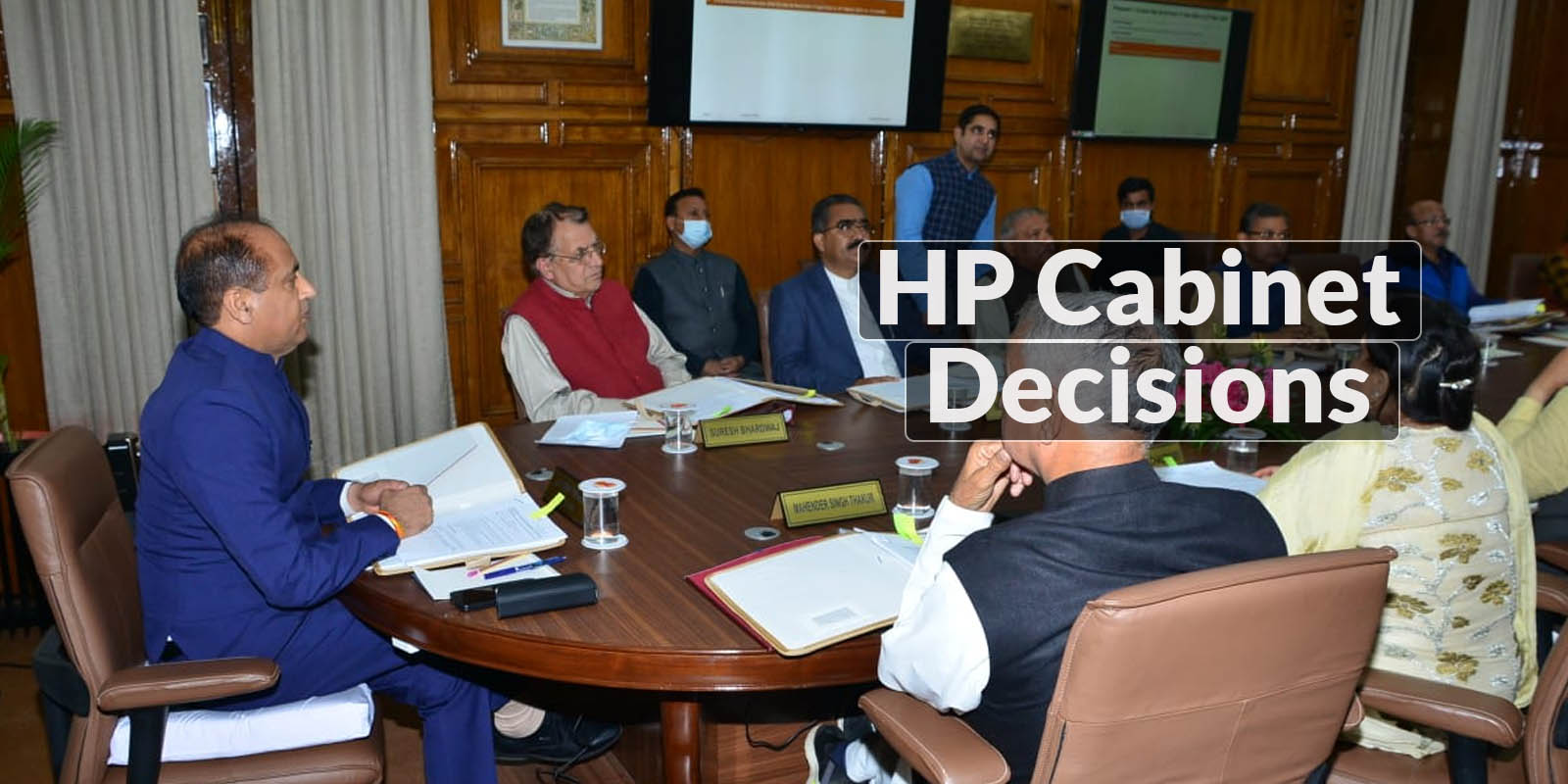
Shimla-A meeting of the Himachal Pradesh Cabinet was held on March 20, 2022, under the chairmanship of Chief Minister Jai Ram Thakur.
The excise policy for the financial year 2022-23 was approved. Approval was also given for the renewal of retail excise vends in the state for the financial year 2022-23 at the renewal fees of 4% of the value of unit/vend.
The State Government said that wants to enhance the government revenue and curb the smuggling of country liquor from the neighbouring states by a reduction in its price.
The brands of Country Liquor will be cheaper as license fees have been reduced. This will help in providing good quality liquor at a cheaper rate to the consumers.
In the new excise policy, the 15% fixed quota of country liquor for manufacturers and bottlers to be supplied to the retail licensees has been abolished. According to the government, this step will give the retail licensees to lift their quota from the suppliers of their choice and further assure the supply of good quality country liquor at competitive prices. The MRP of country liquor will be cheaper by 16% of the existing price.
In this year’s policy, the Gaudhan Vikas Nidhi Fund has been enhanced by Re.1/- from the existing Rs.1.50 to Rs.2.50.
The fixed annual license fee of Bars has been rationalized by abolishing the area-specific slabs of license fee. Now throughout the State, there will be uniform license slabs based upon the room capacity in hotels.
Rates of the annual fixed license fee of Bars in the tribal areas has been reduced considerably.
Further, all the above stakeholders will have to install CCTV cameras at their establishments as it was made mandatory for them.
Wholesale vends and retail vends, the penalty provisions under the H.P. Excise Act, 2011 have been made more stringent.
An end to end online Excise Administration System would be established in Himachal Pradesh, the government said.
HP Government estimates a collection of Rs 2131 crore revenue during the year, which will be Rs. 264 crores higher than the financial year 2021-22 – growth of 14% in state excise revenues.
The Cabinet also gave its nod to amend Himachal Pradesh Disaster Relief Manual-2012 to include deaths due to biting of honey bees, hornet and wasps, accidental drowning and deaths due to accidents of vehicles (including land, water and air) under this Manual.
The Cabinet gave its approval for filling up 11 posts of ‘A’ Class Tehsildar in Revenue Department through direct recruitment on regular basis through Himachal Pradesh Public Service Commission.
HP State Toll Policy 2022-23
The HP Cabinet also gave its nod to HP State Toll Policy for the year 2022-23 which envisages auction cum tender for all the toll barriers in the State. During the year 2021-22, toll revenue has registered a growth of 20 percent of the previous year’s revenue.



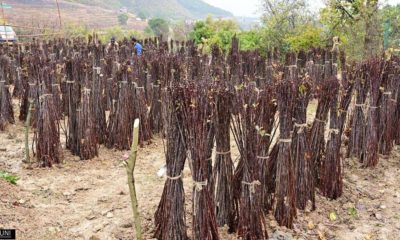

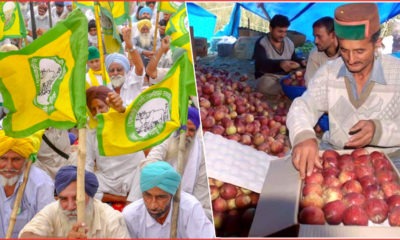









 Home Decor Ideas 2020
Home Decor Ideas 2020
